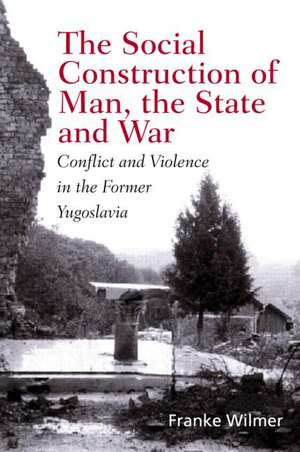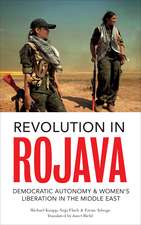The Social Construction of Man, the State and War: Identity, Conflict, and Violence in Former Yugoslavia
Autor Franke Wilmeren Limba Engleză Paperback – 14 iun 2002
| Toate formatele și edițiile | Preț | Express |
|---|---|---|
| Paperback (1) | 398.18 lei 6-8 săpt. | |
| Taylor & Francis – 14 iun 2002 | 398.18 lei 6-8 săpt. | |
| Hardback (1) | 1340.46 lei 6-8 săpt. | |
| Taylor & Francis – 7 iun 2002 | 1340.46 lei 6-8 săpt. |
Preț: 398.18 lei
Nou
Puncte Express: 597
Preț estimativ în valută:
76.20€ • 79.07$ • 63.69£
76.20€ • 79.07$ • 63.69£
Carte tipărită la comandă
Livrare economică 17-31 martie
Preluare comenzi: 021 569.72.76
Specificații
ISBN-13: 9780415929639
ISBN-10: 0415929636
Pagini: 358
Dimensiuni: 152 x 229 x 20 mm
Greutate: 0.66 kg
Ediția:1
Editura: Taylor & Francis
Colecția Routledge
Locul publicării:Oxford, United Kingdom
ISBN-10: 0415929636
Pagini: 358
Dimensiuni: 152 x 229 x 20 mm
Greutate: 0.66 kg
Ediția:1
Editura: Taylor & Francis
Colecția Routledge
Locul publicării:Oxford, United Kingdom
Recenzii
"In a study of the consequences of socially constructing indentity & ehtnic conflict for understanding war, the late-20th-century conflict that occured in the former Yugoslavia is analyzed in illustration...Several rounds of interviews with individuals who lived through the ethnic conflict in the former Yugoslavia were conducted." -- J.W. Parker, Sociological Abstracts
"Although [Wilmer] uses the voices and experiences of Yugoslavs to give her exploration immediacy, she goes deep into psychoanalytical, feminist, constructivist, and international relations theories of identity, conflict, violence, and their larger embodiments: the state and war. This is a brave and humane intellectual enterprise because it addresses head on issues that others either ignore or handle with philosophical or literary flourish." -- Foreign Affairs
"Polished, innovative, critical and insightful. This book may well be one of the best studies, if not just the best, written on the topic of war and enemy construction over the past ten years." -- Francois Debrix, Florida International University
"An extraordinary effort, intellectually more ambitious than anything I have read about any ethnic conflict." -- Ted Robert Gurr, University of Maryland
"Based on an in-depth study of atrocities in the former Yugoslavia, the book teaches: there is no such thing as an innocent chauvinism, no escape from moral responsibility in our shrinking world. Lucidly and compassionately written, Wilmer's text is a vade mecum for people in a traumatized age." -- Fred Dallmayr, University of Notre Dame
"Can constructivism help us understand the collapse of Yugoslavia? Franke Wilmer lets the people of Yugoslavia speak in their own voices. Constructivists have never adequately confronted the unrelenting violence that our moral communities have so often presided over. Professor Wilmer has made it impossible to ignore." -- Nicholas Onuf, Florida International University
"A very interesting and innovative project.gives as good an overview of the long history of Yugoslavia as I have seen anywhere.I think it will be quite provocative and successful." -- Ronnie D. Lipschutz, Associate Professor of Politics, UC-Santa Cruz, and editor of The Myth of 'Ethnic Conflict'
"Franke Wilmer has written an unusually rich book about one of the more bloody chapters in recent international history... Wilmer introduces affect and emotion to a constructivism that has been bereft of both." -- Perspectives on Politics
"Although [Wilmer] uses the voices and experiences of Yugoslavs to give her exploration immediacy, she goes deep into psychoanalytical, feminist, constructivist, and international relations theories of identity, conflict, violence, and their larger embodiments: the state and war. This is a brave and humane intellectual enterprise because it addresses head on issues that others either ignore or handle with philosophical or literary flourish." -- Foreign Affairs
"Polished, innovative, critical and insightful. This book may well be one of the best studies, if not just the best, written on the topic of war and enemy construction over the past ten years." -- Francois Debrix, Florida International University
"An extraordinary effort, intellectually more ambitious than anything I have read about any ethnic conflict." -- Ted Robert Gurr, University of Maryland
"Based on an in-depth study of atrocities in the former Yugoslavia, the book teaches: there is no such thing as an innocent chauvinism, no escape from moral responsibility in our shrinking world. Lucidly and compassionately written, Wilmer's text is a vade mecum for people in a traumatized age." -- Fred Dallmayr, University of Notre Dame
"Can constructivism help us understand the collapse of Yugoslavia? Franke Wilmer lets the people of Yugoslavia speak in their own voices. Constructivists have never adequately confronted the unrelenting violence that our moral communities have so often presided over. Professor Wilmer has made it impossible to ignore." -- Nicholas Onuf, Florida International University
"A very interesting and innovative project.gives as good an overview of the long history of Yugoslavia as I have seen anywhere.I think it will be quite provocative and successful." -- Ronnie D. Lipschutz, Associate Professor of Politics, UC-Santa Cruz, and editor of The Myth of 'Ethnic Conflict'
"Franke Wilmer has written an unusually rich book about one of the more bloody chapters in recent international history... Wilmer introduces affect and emotion to a constructivism that has been bereft of both." -- Perspectives on Politics
Notă biografică
Franke Wilmer is Associate Professor of Political Science at Montana State University, and serves on the editorial board of International Studies Quarterly.
Cuprins
Preface 1. IR Theory and the Problem of Violence 2. What Happened in Yugoslavia 3. The Social Construction of Man:Identity, the Self and Social Theory 4. Identity and (Ethnic) Conflict in the former Yugoslavia: In Their Own Words 5. The Social Construction of the State: State-Building and State Destroying as Social Action 6. The Social Construction of War 7. Causes of War: A Constructivist Account 8. The Other Wars: The War Against Women and the War Against War 9.Identity, Conflict, and Violence












